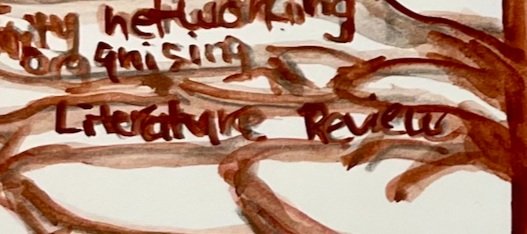
A snapshot of
My Research Tree




My Research Aspiration
The climate crisis will intensify the pressure and anxiety already felt by young people. Taking action is an antidote to worry and despair ( Roderick, 2023). This project harnesses the creative potential of community gardens to cultivate a hopeful vision for the future. My aspiration for my research is to inspire participants to envision and work towards a more just and regenerative future. Regeneration goes beyond sustainability, aiming to thrive rather than merely survive (Hawken, 2021). Key goals include resilience, improving ecosystems, and promoting biodiversity, guided by Bill Mollison's permaculture(1991) principles of regenerative agriculture (Hawken, 2021). Through art, community engagement, and climate justice skills, I use the metaphor of a tree and a permaculture garden to outline my PhD path. This project examines socially engaged arts (SEA) programs that utilise community gardens as transformative spaces for dialogue on climate justice (CJ), addressing the socio-political aspects of the climate crisis influenced by social power and inequality (McGregor & Christie, 2020). I will conduct workshops with students to address local issues, such as food insecurity. I will use arts-based methods to challenge social hierarchies, foster connections, and ensure all participants feel valued in their voices and agency.
Breakdown of my Tree
I have created a growing and evolving tree as a metaphor for my current position in the research journey and my future direction, based on permaculture principles and a 5+ research framework tree (Hopwood, 2020; Mollison et al., 1991). .
My theoretical lens:
Transformative and embodied pedagogies that encourage profound, personal change and holistic learning (Wrigley et al., 2012);
Pedagogies of hope that encourage active engagement, constructive and critical optimism and the ability to process and create resilience to prevent burnout and despair emotionally (Hess, 2022; Ojala, 2012, 2015);
Critical Pedagogy, which challenges oppressive systems, emphasises the power of student agency and voice, as well as dialogue and action, thereby creating opportunities for social transformation through collective action (Kreikemeier, 2021).
The overarching canopy branch with twigs off it: My permaculture principles are the most significant in my tree, with twigs for the principles forming a canopy shadow that nourishes the branches below (Mollison et al., 1991).
Lower branches: the skills I need to develop. The larger branches at the top are stronger, and the lower ones need more nourishment.
Soil: the support system includes my supervisors and academic friends, who will help me on my journey.
The roots: My foundational knowledge and that which connects to others represent my interconnectedness and the grounding of my research in real-world action.
Where I am now: the strong and healthy limbs of my tree
-
Creative practices
I am confident in my creative and critical problem-solving skills. I have developed connections with socially engaged artists eager to participate in the project. I feel assured that I can champion existing community gardens and the use of public spaces.

-
Teaching skills in building Leaders
I am an educator who takes pride in being empathetic, principled, curious, assertive, and passionate. My experience developing educational courses for various age groups and contexts in Australia will be crucial for this research, as will my knowledge of pedagogical approaches, practices, and methods. My experience mentoring and nurturing young activists and students is a strong asset that I can bring to this project.

-
Adaptability, Community networking and organising
My extensive experience as a community organiser will allow me to network more effectively, be adaptable and flexible when needed and apply my project management skills to this project. I have strong connections in the environmental sector and with community gardens.

-
Oral skills
I am a skilled communicator and a confident, adaptable presenter. I have experience communicating and presenting to various stakeholders, including conducting teacher training workshops, multi-age workshops, and working with schools of all types, which will benefit the project's effectiveness.

-
Adaptability, Community networking and organising
My extensive experience as a community organiser will allow me to network more effectively, be adaptable and flexible when needed and apply my project management skills to this project. I have strong connections in the environmental sector and with community gardens.

What is required: to allow the research tree to improve
-

Academic writing
My academic writing skills are at a level where they could be nourished further. Increasing my experience is essential. I set a target of how much I write daily and have started increasing that goal. I am growing my skills further by participating in writing workshops organised by UTS.
-

Data management
I need to improve my skills in the visual analysis of student artefacts (Rose, 2022). I aim to learn to create coded ethnographic data on themes and conduct comparative case studies by reading widely from the extensive UTS library database and beyond. To deepen my understanding, I've enrolled in multiple qualitative research courses.
-

Methodologies
I lack confidence in qualitative research methods, particularly decolonising methodologies, which I wish to incorporate. Visual methodologies are new; I will engage in relevant GRS workshops and read extensively about these approaches.
-

Literature review
Conceptual analysis is a challenge for me in this work. I am developing my writing skills by sending initial drafts to my supervisors for feedback and to external academics weekly. I need to improve my skills in synthesis and critical analysis.

